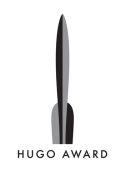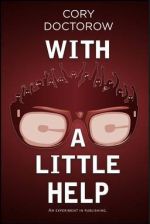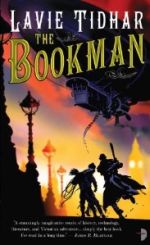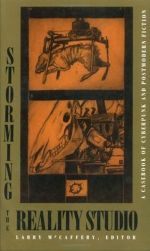Time, Like Blood, on My Hands
Dolores still lived in our house, but I hadn’t seen her in years. We all use that nicety. I haven’t seen so-and-so in years. Everybody knows what it means; no one will press further. In this way you can neatly explain any absence. Fathers, friends, children, acquaintances, any human being. Wives. You can say that about a wife.
That morning I had met a classmate of mine, one I hadn’t seen for better than a decade. Harold Hemard. I was coming out of my bank; he was going in. We stopped. My brain grabbed up the name, dragging along with it the kind of favorable impression that told me this wasn’t someone I needed to automatically avoid.
“Sid? Sidney Gaddis?”
I had time to talk, so I lingered outside the bank’s wide doors with him for a few minutes, more than just a casual, pseudo-friendly hey-how’s-it-going brush-off. Harold and I, I remembered, had been friends, or near enough. I hadn’t known he was on this time tier.
Eventually, because I had gotten married while still in school, he asked with a hint of caution, “How is Dolores?”
And I said what is commonly said.
He nodded, in the accepted, quietly sympathetic way. Emotional displays, especially over absent loved ones, are frowned upon these days. If we all let ourselves go over what had happened, this world would be a shrieking, raging, straitjacketed madhouse.
“Hey, how about dinner?” Harold suggested. He had put on weight, but wasn’t fat. I imagined that I, with the gray in my hair, was just as startling a reminder of the years that had gone by.
Again, I felt no impulse to brush him off. “Dinner? I’d prefer drinks.”
“Sure.” He reached out and gave my shoulder a quick pat. These days it was an almost intimate contact. “I’ll give you a call tomorrow.”
I went home. In the kitchen, I reached into the fridge for a carton of orange juice–the same brand I’ve always used, standing in the same spot on the interior door shelf where it’s always kept–and felt…resistance. A tug. The carton was too heavy. Or, really, it was being acted on by another force. I stood frozen there, feeling a heat or a chill roll over me. It was how horror movies affected me when I was a boy; or what a really good kiss did when I was a teenager.
The ethereal grip on the orange juice carton lasted maybe four seconds, but I noted each one of them. Then the pull vanished, and I drew out the carton and shut the refrigerator door and poured myself a glass. I just stood staring at it until it got warm, however.
Dolores, on her tier of time, had been reaching for the carton at the same instant as me. She still lived here. She, like me, kept established habits. The orange juice went where it always went. Our hands had touched, so briefly, across an impossible temporal gulf.
* * *
I dressed up. I wanted to make an effort. Harold hadn’t been blowing smoke; he had called, set the arrangements. A few others were going to join us. I didn’t mind that. I had been a little leery of running out of things to talk about with my former classmate–how much of our pre-Fracture college lives could we reasonably relive?–and was glad there would be others to run interference. That gave me an out, if I wanted to bail on this later. I entered through the club’s chrome doors in the late, wooly-pink twilight.
“Everybody–this is Sidney Gaddis, a dear old friend. We were a pair of party savages once upon a time…”
As Harold made these introductions, I had one of those moments. I was suddenly aware of the big broad space around us, the thump of bass and the rattle of glassware, though the music and ambience didn’t really register. Instead, I realized on a profound level how many people were here at this club. Probably around two hundred. That seemed like a staggering number to have all in one place.
It was stupid of me. Moments like this always are if you’re able to take a step back from them, but that doesn’t usually happen until later on. Right now, I was–literally, I think–slack-jawed. Stupid. It won’t faze me that my cell phone will reach a number on the other end of the continent. I take it for granted that railroads function and the supermarket’s shelves are stocked and satellites still orbit our planet. The world continues, with all or most of its frills. But confronted with a roomful of club-goers out for a good time, I was gobsmacked.
It’s just, of course, that we are so few people now. Relatively speaking, anyway. Compared to the pre-Fracture…
“Sidney? Hey, I was just telling Denise–”
Harold’s chubby cheeks were red, but he wasn’t making an ass out of himself. He knew everyone who was assembled around a cluster of high tables. I hadn’t been out with a group of people in a while, but I thought I could still function socially.
Harold and I were the old-timers in this crowd. The others were mid-twenties things, male and female. I got a hold of a cocktail as quickly as I could. The club had a nice pulsing energy that I didn’t try to resist.
Harold dominated my time for a while, and again that was okay by me. We reminisced, of course. I remembered general things, but some of the specifics he mentioned were lost on me. I smiled, nodded, drank one cocktail, then another, until I realized that some of what he was saying was just plain wrong. Not all these events had actually happened, or hadn’t happened quite this or that way. Maybe Harold was confusing me with some other school chum.
He was getting noticeably loaded by now but still, thankfully, not obnoxious. I was more grateful that he didn’t bring up Dolores, who he’d met of course. Eventually he drifted off to talk with the others, grandly ordering everybody another round.
“Come with me and dance?”
I blinked, trying to remember the last time any woman had asked me to dance. I left her hanging there for the space of four seconds. The same amount of time that I had felt Dolores tugging at the orange juice carton yesterday.
“Sure,” I said; and almost added thanks, which would have implied she was doing me a favor. Maybe she was.
We hit the dance floor, which didn’t seem to have any official boundaries. The music swamped over us. She was a young medium-attractive woman with bristly dark blond hair, cool hazel eyes, and a tattoo of some sort peeking up out of the collar of her snug purple jacket. She wore formfitting black pants that turned out to be black leggings and a dark codpiece-like thing.
The music didn’t begin or end. New bass lines crept in, and the melody changed. I kept up with my dance partner. We didn’t try to talk over the music.
She flashed smiles that seemed timed to the different rhythms, but I let myself think she was smiling at me anyway. I wanted very much to ask her her name. Harold had probably said it earlier–she had been a part of our group from the start, I knew that much–but it hadn’t stuck. Nobody’s had, really. I figured tonight was a one-off encounter with Harold. We could think about doing this again in another ten years.
I wondered about that, suddenly chilled. Did I really think people were that disposable? How could I? How could anyone think like that? People were, after all, a lot rarer than they used to be.
“I’d like a drink.” She was leaning close, yelling into my ear.
I nodded. “I’ll get you one.” I took her arm and started toward one of the club’s serving stations.
When we were out from under the music, she said, “I didn’t mean that I expected you to buy me a drink.”
“I know that,” I said, but I was dismissing what she was saying.
She stopped before we got to the black varnished bartop. Her cool eyes flickered with a hint of deep hazel heat. “I mean it. Now I’m going to have to buy you one to prove it.”
I almost said no-no-thank-you-but-no in my best fake-gentlemanly manner, but then thought I shouldn’t disregard anything she said. “That would be nice.” I told her what I was drinking.
We stood under a bank of fans, big grilled industrial monsters, and I felt sweat cool on my body. We had danced our way clear across the club. Harold and the gang were now a faceless happy group on the far side. Or they looked happy from here.
“It’s so many people.”
“Huh?” I regretted that immediately. I should have been paying attention. After all, she had bought me my drink.
She was sipping from something green and sticky-looking, with a lot of cracked ice. Her eyes roamed the club. “I think how many…empty…places I see. Houses with no one living inside. Commercial spaces just sitting there. Then–all these people. It’s silly, isn’t it?”
She wasn’t someone who just threw out random questions, I was now sure. “Before, when I was having that same thought, I was thinking it was stupid. But silly is a nicer word.”
“There are less than a billion people on the Earth,” she said.
Far less, if some census estimates were to be believed. I said, “Less than a billion. I’ve heard that phrase. It’s an odd one. We don’t talk about anything else as being less than some huge amount like that. If you’ve got four apples, nobody says, look, I’ve got less than a peck.”
“Bushel, I think. A bushel’s bigger than a peck. But it’s a good point, Sidney.”
“Sid. Please.”
“Sid,” she said and smiled, and this time it was for me, without question. I realized with a little start that I had forgotten to ask her name. Maybe it showed on my face. She said, “My name is Carey.”
“Would you like coffee?” I asked.
She was still sipping her green drink through a miniature straw. “Here?”
“No. Not here. Someplace else.”
Her hazel eyes shifted away. More people had come into the club since I’d arrived.
“Someplace else, then,” Carey said.
* * *
It wasn’t any kind of straight line from the club to her place. We did go for coffee, at a diner, and ordered something to eat too so that we wouldn’t tie up a booth with a couple of mugs. I had another of those profound moments, this time amazed that we still take such normal things into consideration. The waiter lived on tips; you can’t tip much off a pair of coffees; so, order food to inflate the bill. We still play the game, even years after the Fracture.
But I was more interested in Carey.
I hadn’t said goodbye to Harold at the club, but I had already decided that I would see him again. No one could be easily discarded. Somehow I’d been reminded of that.
Over the coffees, Carey and I talked. We traded all the usual information and omitted what we needed to. She’d had parents; I’d had a wife. We didn’t talk about these people in detail. Because that’s not the way. Because the pain is just blinding. We keep stoic about it, for our own good. It’s maybe an English way of behaving. Or a Japanese. Or just, finally, human.
“You went to school with Harry?”
Harry? Was he calling himself that now? “Yes.”
“I knew that, of course. He said. I felt like you two hadn’t seen each other for a while.”
“We haven’t.” I tried to remember exactly when the last time had been. It really only mattered that it was before the Fracture, but it would have been crass to just say that.
“Did he used to be as outrageous as he says?” Like with her nameless green cocktail at the club, she didn’t hurry with her coffee.
“I’m not sure,” I said.
She looked at me a moment. “That’s the truth, isn’t it?”
“It is.”
“I like truths.”
Carey, I’d already found by then, was pleasant to be with.
It was not a straight line from the club to her place. Not a straight line from the diner either.
We had left the club in my vehicle. Carey mentioned the beach, and the whimsy of that hit me just right. The night was warm. I took the nearly empty freeway, and she pointed to a coast turnoff. We crunched into a sandy deserted parking lot, left our shoes in the car, and walked through the thigh-high beach grass. The waves sounded strange coming in, and I figured the dance floor music had done an ear-trauma thing on me. Funny that I hadn’t noticed it at the diner.
“Can we go up there?” We had walked for a while along the waterline. Now she was pointing ahead. “I mean–will you come up with me?”
I looked at the pile of rocks shining in the moonlight, past signs warning against climbing. She was, from what she’d said, going to go up with or without me. I smiled and said, “Sure.”
We climbed. It was pretty easy in bare feet. The air was bracing. When I licked my lips, I could taste salt. The waves hit the rocks’ base and threw foam up at the moon- and starlight. A bad step or a slip and there would be serious trouble, but this was fun, a little adventure.
“Whenever I come out here, I climb up here,” she said. The wind off the water rippled her dark blond hair.
“Why?” I asked. There had to be some significance, and I wanted to know.
Her eyes shone like the wet mossy rocks. “I never feel like there’s anyone else here. In whatever time tier, those signs warning people off the rocks are going to be there. This is just a big dumb dangerous pile of stone. When I’m here, that’s it, that’s all. Nobody else. I like that.”
Her laugh came suddenly, and she reached out her hand toward me. I took it.
She added, still laughing, “Being here with you is different, though. It’s very nice.”
That sounded like honesty to me. And I liked it.
We didn’t travel in a straight line from the beach to her place, to the house that had belonged to her parents. My home was a lot closer, and I couldn’t come up with a good enough reason–nothing I was going to say out loud, anyway–not to go there.
So I took her to my place, the home I still shared with my wife Dolores.
* * *
I wasn’t very good at this. I had married young, to a woman who meant everything to me, and it had taken me out of the dating/hooking-up scene during my formative years. I didn’t regret it. But what I was doing with Carey happened maybe three times a year for me. I wasn’t a klutz, but I did fumble some and hesitate a lot, until finally, in the kitchen doorway of all places, I kissed her.
Her eyes stayed closed for several seconds afterward. Certainly I was attracted to her, and she must not mind our age difference.
“You kiss nice, Sid.” The hazel eyes opened.
I didn’t get the feeling this happened too often for her either, but I could have been completely wrong. Maybe she got a guy every night. That didn’t bother me. But women–and men–who pursue sex like it’s their next hot meal get a hard bruised look about them. She didn’t have that.
Carey was looking past me. I started to turn, then knew what she was seeing. On the small breakfast table of blond wood were the scattered plastic letters, the sort preschoolers play with. They were refrigerator magnets, but I’d never put them up on the fridge, since there were postcards and pages torn from old desk calendars with aphorisms on them already on the door. I hadn’t wanted to move anything there, so I’d used the table for the plastic, brightly colored letters.
It was, to use a description from earlier, stupid. Stupid, not silly. I had bought the box of letters after. After the Fracture. Why would Dolores have done the same thing?
I said, “There are no kids in the house. There never were.”
“Oh.” Suddenly her voice was small.
I saw the sadness digging in under the edges of her face, and I pulled her back into my arms. It was what we all felt, and it could come out at any time. That was the reason for the general stoicism. If she had said she wanted to go home right then, I would have driven her and not felt a shred of regret the way there or back, or even later on, lying alone in the bed I shared with my wife.
But she drew a deep breath. She kissed me and took my hand again, and we went into the bedroom.
* * *
It was fine, it was fun, it had all the release and satisfaction I would need for some while. I felt spent and vaguely cheerful afterward, and deliberately didn’t examine the moment too closely. I didn’t think about seeing Carey again. Neither was I scheming to get her out of here as fast as possible. There was no hurry. We had shared something, and I felt good about it, for now.
It would have stayed fine and serene like that too, if she hadn’t gotten out of the bed, stretching herself luxuriantly like a cat, turning so that I could see her intricate black-ink tattoo. She smiled over her shoulder, then wandered the bedroom, a slow prowl, looking things over. Actually, that wouldn’t have done anything to upset the pleasant afterglow either.
But when she got to the antique vanity, she reached for the hairbrush on top of it.
I jackknifed up off the bed and sprang at her. I don’t want to imagine what my face looked like. She made a frightened, strangled sound, staggered back a step, and dropped the brush. I hurled myself and caught it before it hit the floor, though what difference that would have made I didn’t know. It was the moving of it at all that had set me off. The hairbrush was heavy, old like the vanity, backed with scrolled silver. Dolores had confined her taste for antiquities to this table and its accoutrements. I had never thought it silly of her.
Carey’s hazel eyes were wide, almost quivering. Very gently I put the brush back on the wood surface, at the very angle at which it belonged.
I made it easy for Carey. I said, “Let’s get dressed, and I’ll take you home.”
Wordlessly she collected her leggings, codpiece, snug purple jacket and the rest of her stuff.
* * *
I didn’t walk her up to her door in the old-fashioned manner. The drive over had been silent, but at her curb she looked at me, and without any rancor at all said, “After it happened and I was alone here”–she gestured at the house–“I renovated. I painted walls, moved around furniture, tore up carpeting. I even threw things out. My parents’ things. Because where they are, they’ve still got that stuff.”
I was still gripping the steering wheel, and my knuckles were starting to ache. I was sure there would be more and knew I deserved whatever she was going to say. But she leaned across the seats, brushed her lips over the corner of my mouth, and exited.
It was a straight line from her place back to mine.
At home, I returned to the bedroom and looked again at the silver hairbrush, as if to confirm that it was precisely where it should be. The last place Dolores had set it down. Hopefully, the place it still occupied on her time tier. Points of contact. Mutualities. We were separated by nanoseconds–she was either ahead or behind, but close, so very close.
The brush, I saw, was of course where it should be, where I’d kept it all these years.
They call the Fracture a provable phenomenon, since it is measurable, since instruments of sophisticated detection have established the existence of multiple tiers of time, pressed flush against ours. Learned men and women have determined that the human race has been broken up and scattered across these planes, which exist independent of one another. Autonomous realities. Time tiers. But no scientist, no philosopher anywhere, knows how the Fracture happened. Or why.
I tidied up the rumpled bed. Carey hadn’t left anything behind. I wandered out of the bedroom, heading to the kitchen.
Guilt never really overwhelms me on these occasions. I don’t bed a woman often enough to feel like a cad, and I honestly don’t begrudge Dolores whatever she might be doing. I know that she thinks about me and maintains the same sort of vigil I do, or else she would have done like Carey had. She would have rearranged this house, or moved out altogether.
I was tired as I sat down at the small breakfast table. With little conscious effort I started moving around the colored plastic letters. Maybe Dolores had gotten a box of them as well and chosen this same space for them. We were married for many years. A lot rubs off. I remember quite a few lovely times when we finished each other’s sentences, or seemed to pluck thoughts right out of the other’s head. Maybe Dolores’ thinking had carried her this same way.
My hands slid the plastic pieces over the wood, spelling out yet another simple message–I LOVE YOU, I MISS YOU, something like that–hoping to detect the tug, the pull, the feel of her hand reaching for mine across the hopeless, hairsbreadth-wide gulf of time.
The End
Eric Del Carlo is the coauthor, with Robert Asprin, of the Wartorn fantasy novels published by Ace Books. They also collaborated on NO Quarter, a pre-Katrina murder mystery written when they were neighbors in the French Quarter of New Orleans; this novel is published by DarkStar Books. Eric’s solo short fiction has appeared in Strange Horizons, Futurismic, and many other places, and is upcoming in Asimov’s. He currently lives in his native California.
























3 comments
[…] Time, Like Blood on my Hands by Eric Del Carlo […]
[…] Motherhood by Christopher Miller […]
Intense, simple and beautiful. I love stories of the “aftermath” of something happening and how we deal with it. Mr. Del Carlo, this was a wonderful and very memorable story.